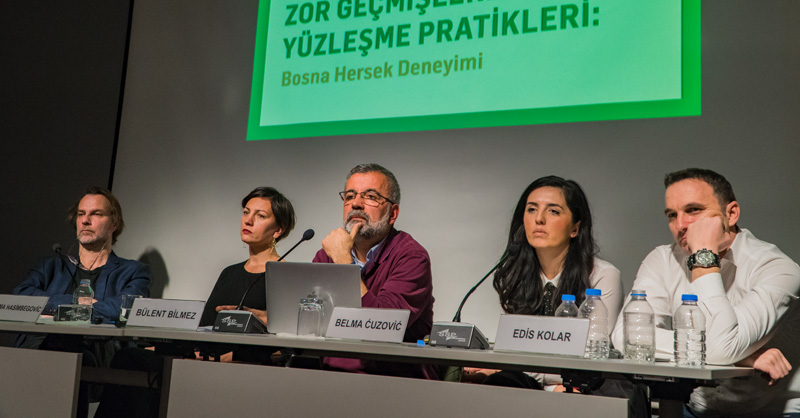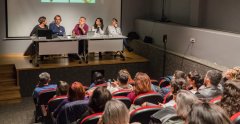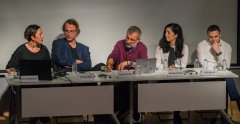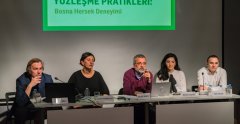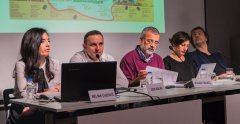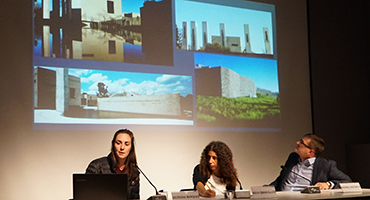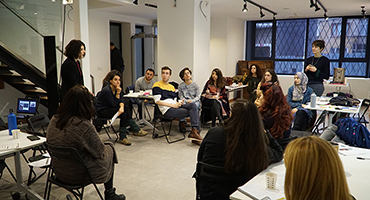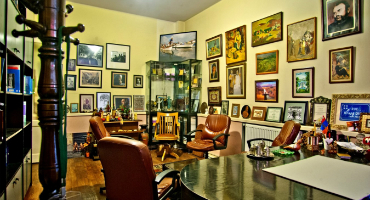The panel, “Practices of dealing with difficult pasts: Bosnia and Herzegovina” organized by the Hrant Dink Foundation and DVV International took place in Hrant Dink Foundation Havak Hall on 01 December 2017. The panel focused on the practices and experiences of museums and memory sites that are working on dealing with the crimes committed against humanity at Bosnia and Herzegovina in 90’s.
The panel was moderated by the historian Bülent Bilmez, and the panelists were Belma Ćuzović, museum educator of Tunnel of Hope in Sarajevo; Edis Kolar who is one of the founders, honorary curator and guide of Tunnel of Hope; Elma Hašimbegović who is the director of History Museum of Bosnia and Herzegovina and Nicolas Moll who is the founder of Memory Lab.
Belma Ćuzović and Edis Kolar in their presentation named “Selective memory is not an option. Lessons learned: Bosnia and Herzegovina”, shared their experiences and observations on how to keep memories of recent past alive in very difficult political circumstances. They mentioned about how the fact that postwar Bosnia and Herzegovina is governed by both victims and executors of the horrible crimes that happened in the early nineties, and how these political circumstances created obstacles for them to deal with the past. Edis Kolar shared with the audience the process through which his home was turned into a tunnel during the war, and transformed into a memorial site and a monument named Tunnel of Hope in the post-war period. Panelists pointed out that one of the primary target group of the memorialization practices applied within the scope of Tunnel of Hope is the students. They also shared their observations on how the narration of the historical facts through personal stories has transformative impacts on students.
Zor Geçmişlerle Mücadele Pratikleri:Bosna Hersek Deneyimi paneli yapıldı
In her presentation named, “Exhibition on the siege as a platform for a constructive dialogue about difficult past – Experiences from the History Museum of Bosnia and Herzegovina”, Elma Hašimbegović mentioned about the impact of History Museum of Bosnia and Herzegovina on developing constructive dialogue. Her presentation had a special focus on the experiences how the exhibition is used as a platform for a constructive dialogue about difficult past within the local community, country and as well as within the region. She also mentioned about what they learned from the difficulties they faced and how they turned these difficulties into their advantage. She commented on the fact that there is a lack of a local platform on which people and institutions that are working on memorialization can discuss together. She mentioned about how telling about the difficult pasts is facilitated through art works and objects. She underlined the importance of creation of the museum space as a participatory processes which is based on events organized with the local community.
Nicolas Moll who is working on post-war memorialization and reconciliation processes in South Eastern Europe after the 1990s and in Western Europe after 1945, made a presentation named “Sharing and connecting experiences in dealing with the past: Memory Lab's work in and with Bosnia and Herzegovina”. In his presentation he mentioned about Memory Lab - Trans-European Exchange Platform on History and Remembrance that brings together organizations, institutions and persons from Southeast Europe and from Western/Central Europe, which are working on memory sites and remembrance education related to difficult pasts (wars, mass crimes, dictatorships). Also he mentioned on how the Memory Lab is structured, what are specificities of this initiative, which challenges it is facing, and shared the impact of the work of Memory Lab. He mentioned that even though 20 years have passed after the war there are still challenges against working on the war. He criticized the fact that in Bosnia most of the places where massacres took place are not turned into memory sites and there are no memorials to remind what had happened in those places. He highlighted the importance of working on these places that are not transformed into memory sites along with working on the already existing memory sites.


